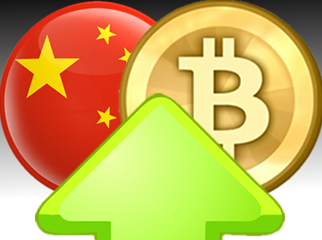 As US financial regulators continue to look for new ways to rein in the popularity of the Bitcoin digital currency, China is embracing the technology in a big way. In May, China topped the Bitcoin client download chart for the first time, outpacing US downloads by a ratio of 85k to 64k, good enough for nearly one-third of all Bitcoin downloads last month. This is part of a trend that has accelerated rapidly since the start of 2013, with China’s share of the total downloads to date rising from 5% to 9% over the past five months, elevating China to #2 on the all-time download list.
As US financial regulators continue to look for new ways to rein in the popularity of the Bitcoin digital currency, China is embracing the technology in a big way. In May, China topped the Bitcoin client download chart for the first time, outpacing US downloads by a ratio of 85k to 64k, good enough for nearly one-third of all Bitcoin downloads last month. This is part of a trend that has accelerated rapidly since the start of 2013, with China’s share of the total downloads to date rising from 5% to 9% over the past five months, elevating China to #2 on the all-time download list.
Over the same period, China’s share of the Bitcoin trading volume has more than tripled, accounting for nearly 6% of all trading. China has also surpassed the US in the number of active global nodes by a ratio of 23% to 20%. All of this growth has occurred despite China having the lowest number of Bitcoin client downloads relative to its internet-connected population of any of the top Bitcoin downloading nations, leaving plenty of room for future growth.
So what happened to send China into a Bitcoin frenzy? The mammoth value bubble Bitcoin experienced earlier this year obviously didn’t hurt, but far more significant was the fact that in the first week of May, a Chinese state-run broadcaster aired a documentary on Bitcoin that painted the digital currency in a favorable light. It may seem odd that China, a country that imposes strict controls on money moving out of the country, would take a favorable view of an alternative currency with Bitcoin’s relative anonymity, but there’s an interesting conspiracy theory making the rounds.
Johnathan Stacke over at Bitcoin news site TheGenesisBlock.com suggests China’s Bitcoin boosterism is but one plank of the country’s long-term goal to dethrone the US dollar as the world’s reserve currency. China’s leadership has been sharply critical of the ‘quantitative easing’ (aka money-printing binge) the US embarked upon to minimize the fallout from the 2008 economic crisis. As the number one holder of US foreign debt, China is not shy about speaking its mind regarding the Federal Reserve’s actions.
Other planks of this ‘dump the dollar’ strategy have included making oil transactions in currencies other than the US dollar, undermining a system that has existed for nearly half a century. China has also struck direct swap deals with countries like Australia and Brazil, eliminating the need to first convert their respective currencies into greenbacks. While Bitcoin is unlikely to pose a threat to the US dollar’s supremacy anytime soon, the ever patient China appears content to employ a ‘death by a thousand cuts’ strategy.
Of course, like the nuclear scientists who regretted their role in developing the atomic bomb the instant they saw the first test explosion, China may yet come to regret its Bitcoin cheerleading. While some Bitcoin advocates are skeptical that the digital currency is ready to handle the volume of money movement required by Macau’s junket operators, Bitcoin has been touted as an ideal method for Asian-facing online gambling operators to get around China’s prohibition on moving money on and off online sites. Now if only China’s state broadcasters would run a few positive pieces on online gambling sites, we’d really be getting somewhere.
